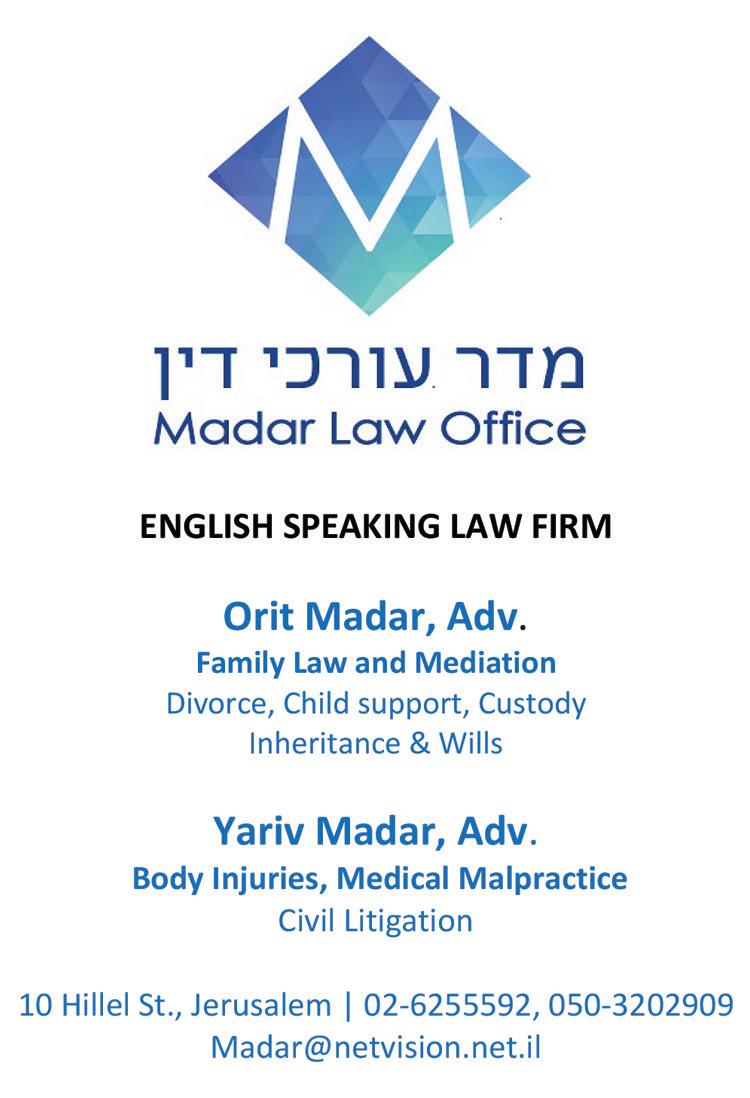
5 minute read
Rabbi Moshe Bloom
TORAH VEHA'ARETZ
INSTITUTE
Advertisement
BY RABBI MOSHE BLOOM
www.toraland.org.il/en
Beha’alotecha: Going Up (and Down) Cabbage and Collard
Question: I am growing a vegetable called by many names, including: tree collard, tree kale, walking stick collard, which I grew from seeds bought on eBay.
This collard plant lasts many years. We have been eating the leaves from the same plants for the last three or four years. The plants are almost 5-6 ft tall. I am cutting off branches and rooting them to make new plants.
Could these plants be considered trees or just long lasting vegetable plants?
Answer: Cabbage is mentioned by the Sages as a large, perennial plant. The Mishnah (Orlah 3:7) lists items that were considered important due to their size, value, or nature. One of them is kolsei keruv, explained by the Rosh as “Cabbage stalks of the Land of Israel that were large.”
The Gemara (Ketuvot 111b) states: “Our father left us a cabbage stalk and we would go up and down it with a ladder.” While possible that this anecdote is hyperbolic, we see that cabbage towered high, and obviously grew for an extended period of time.
Rashi (Beitzah 3b) comments: “Cabbage stalks with their leaves, and the cabbage of the Land of Israel was as large as a tree, as stated in Ketuvot.” Nevertheless, we do not see anywhere that cabbage is treated halachically like a tree; it was clearly viewed as a vegetable.
From the Mishnah in Shevi’it (9:1, on sefichin), it seems that cabbage is a perennial plant. Rashi writes: “But not so the sefichin of cabbage; rather, its leaves grow on branches ….”
For more on this topic, see Moshe Raanan’s article on the Daf Yomi Portal, Ketuvot 75.
In conclusion: Chazal note that cabbage can be perennial, but nevertheless define it as a vegetable. For this reason, kale/ collard is considered a vegetable despite its perennial nature.
D o n ’ t w a i t f o r t h e n e x t C h a m s i n

POST YOUR ZOOM EVENT FOR FREE

https://bit.ly/2WXUxgR
LEAVE MEETING
LEAVE MEETING
RABBI EPHRAIM
SPRECHER
Faculty, OU Israel Center
The Menorah – Light Up My Life!
Parshat Beha’alotcha begins with the Mitzva for the Kohen to light the
Menorah daily, in the Mishkan and later on in the Beit HaMikdash even on Shabbat.
What is the message of the Menorah for us when we have no Mikdash? And we know that the Torah is Gd’s GPS (Gd’s Personal System) for us in the year 2020 and beyond.
The Mishna (Avot Ch. 4) teaches, “There are three crowns: The crown of Torah, the crown of Kehuna (priesthood) and the crown of Monarchy.” Corresponding to these three, with which Israel were crowned, there were three crowns on the Temple vessels. The crown of Torah corresponds to the gold crown, which was set on the Ark of Testimony (containing the Two Tablets). The crown of Kehuna corresponds to the incense altar, for only regarding the Kohanim (priests) does it say, “They shall place incense in Your Presence, and put sacrifices on Your Altar” (Deuteronomy 33:10). Finally, the crown of monarchy corresponds to the table in the Sanctuary, for tables, which in Biblical and later Hebrew can symbolize wealth and bounty (see Psalm 23), may here be viewed as evoking the economic and political power of the state.
Still, the Mishnah adds that there is yet another crown, “the crown of a good name,” which “surpasses them all.” This crown is NOT enumerated among the others. Rather, it is kept separate from them and it stands on its own. To what does this crown correspond in the Temple?
The Maharal of Prague associates this crown with the fourth vessel of the Temple - the pure-gold Menorah. The Menorah has no gold crown on it. Neither is it made of acacia wood inlayed with gold. Rather, the whole menorah is like a pure golden crown, embellished with golden cups, spheres and flowers. The crown of the menorah is not something extrinsic to it - the menorah itself is a crown.
It is the same with a person’s good name. It is not an external crown that is placed upon his head. A man’s good name touches on his very essence. It includes his whole personality in all its components. It is not an external image, fashioned by public relations professionals, photographers, and newsmen. A person’s good name is the reputation that he earns for himself
through his whole life’s work, all his deeds and ventures. That is why this crown surpasses all the others.
A man’s good name does not find expression at the beginning of his life. Rather, it is acquired through strenuous, daily toil over the course of one’s whole life. King Solomon therefore said, “A good name is better than precious oil” (Ecclesiastes 7:1). But however good it may be, oil is applied externally to a person’s body, while a person’s good name is that person himself.
Moreover, that same verse concludes, “and the day of death is better than the day of birth.” Only on the day that a man dies is the good name that he acquired for himself during his life fully revealed. The Menorah cause us to reflect on the type of life we are living.

Mortgage RATES at historic LOWS for refinance & purchase
Purchase / Refinance Rates (Non-inflation linked)*
Special rates up to 75% LTV:
30 year 3.85% 15 year 2.90% 10 year 2.75%
For well qualified borrowers
firstisrael.com 02-625-2555 60 King George, Jerusalem 3 Aluf Kalman Magen, Tel Aviv
*Rates are for quali ed borrowers and are current as of the printing of this advertisement but are subject to change. Quoted rates do not represent an offer and are for illustrative purposes only.










